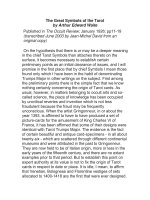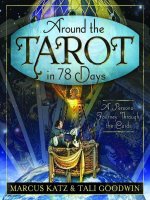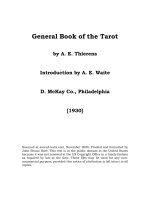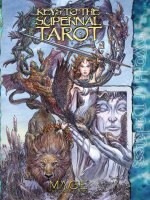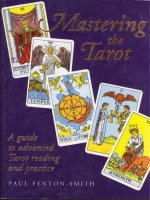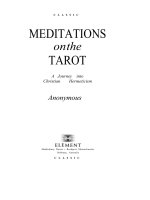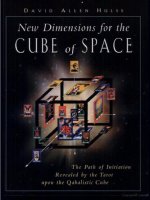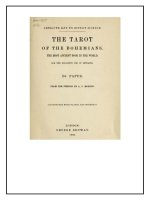Hướng dẫn bói bài Tarot The great symbols of tarot
Bạn đang xem bản rút gọn của tài liệu. Xem và tải ngay bản đầy đủ của tài liệu tại đây (80.21 KB, 12 trang )
The Great Symbols of the Tarot
by Arthur Edward Waite
Published in The Occult Review; January 1926; pp11-19
(transcribed June 2003 by Jean-Michel David from an
original copy)
On the hypothesis that there is or may be a deeper meaning
in the chief Tarot Symbols than attaches thereto on the
surface, it becomes necessary to establish certain
preliminary points as an initial clearance of issues, and I will
premise in the first place that by chief Symbols I mean those
found only which I have been in the habit of denominating
Trumps Major in other writings on the subject. First among
the preliminary points there is the simple fact that we know
nothing certainly concerning the origin of Tarot cards. As
usual, however, in matters belonging to occult arts and socalled science, the place of knowledge has been occupied
by uncritical reveries and invention which is not less
fraudulent because the fraud may be frequently
unconscious. When the artist Gringonneur, in or about the
year 1393, is affirmed to have to have produced a set of
picture-cards for the amusement of King Charles VI of
France, it has been affirmed that some of their designs were
identical with Tarot Trumps Major. The evidence is the fact
of certain beautiful and antique card-specimens - in all about
twenty-six - which are scattered through different continental
museums and were attributed in the past to Gringonneur.
They are now held to be of Italian origin, more or less in the
early years of the fifteenth century, and there are no extant
examples prior to that period. But to establish this point on
expert authority at its value is not to fix the origin of Tarot
cards in respect to date or place. It is idle, I mean, to affirm
that Venetian, Bolognese and Florentine vestiges of sets
allocated to 1400-1418 are the first that were ever designed.
In view, however, of the generations of nonsense which we
have heard testifying on the subject, it must be said that it is
equally idle and mischievous to affirm that they are not.
When, towards the close of the eighteenth century, Court de
Gebelin first drew attention, as a man of learning and an
antiquary, to the fact of Tarot cards, he produced sketches of
the Trumps Major in the eighth volume of Le Monde Primitif.
In the form that he had met with they were not priceless
works of art like those in the Bibliothטque Nationale, but
rough, primitive and barbarous, or precisely of that kind
which might be expected to circulate in country places,
among lower classes of players and gamblers, or among
gipsies for purposes of fortune-telling. Supposing that they
had been designed and invented originally about the period
mentioned, nearly four centuries had elapsed, which were
more than ample time for them to get into general circulation
throughout the countries in which they were traced by Court
de Gebelin - namely, Southern France, Spain, Italy and
Germany. If the Trumps Major were originally distinct from
the minor emblems, there was also full opportunity for them
to be joined together. But alternatively the designs, perhaps
even in several styles, may have been old already in the
year 1400 - I am speaking of the Trumps Major - in which
case they were married much later to the fifteenth century
prototypes of our modern playing-cards. It will be seen that
the field is open, but that no one is entitled in reason to
maintain either view unless evidence should be found to
warrant it in the design themselves, apart from the real or
presumptive age of the oldest extant copies.
Having done something in this summary manner to define
the historical position, the next point is to estimate the
validity of those speculations to which I have referred
already. It is not possible on this occasion, nor do I find that
it would serve a purpose, to do more than recapitulate my
own previous decisions, reached as a result of researches
made prior to 1910. The first and most favoured hypothesis
concerning Tarot cards is that they are of Egyptian origin,
and it was put forward by him who to all intents and
purposes may be called their discoverer, namely, Court de
Gebelin. It has been set aside long since by authorities apart
from predispositions and ulterior purposes in view. De
Gebelin was an Egyptologist of his day, when Egyptology
was in its cradle, if indeed it can be said to have been born,
and that which he did was to excogitate impressions and
formulate them in terms of certitude. They have not been
borne out, and their doom from the standpoint of sane
scholarship may be said to have been sealed when they fell
into the hands of French occult dreamers and were
espoused zealously by them. The most salient and amazing
elaborations were those of Eliphas Lיvi in 1856 and onward.
The designs were for him not only Egyptian in the sense of
the earliest dynasties, but referable to the mythical Hermes
and to the prediluvian wisdom of Enoch. They formed
otherwise the traditional Book of Adam which was brought to
him in Paradise by an angel, was removed from him at the
Fall, but was restored subsequently in response to his
earnest supplications. Eliphas Lיvi did more, however, than
theorize on the subject. He gave pictorial illustrations of the
cards restored to their proper primeval forms, in which they
appeared as pseudo-Egyptian designs, the work of an
amateur hand. The same practice prevailed after Lיvi had
ceased to publish. It was developed further by Christian,
while long after him, under the auspices of Oswald Wirth and
others, the Trumps Major appear in all the panoply of
imitative Delta art. These things are to all intents and
purposes of dishonest device, but very characteristic
unfortunately after their own manner, for the marriage of
speculative occultism and intellectual sincerity has hardly
ever been made in France and seldom enough elsewhere.
These are the preliminary points Which are placed here for
consideration - as I have said, to clear the issues. In the
complete absence of all evidence on the subject, we must be
content to carry an open mind as to where Tarot originated,
remembering that the earliest designs with which we are
acquainted do not connote antiquity, unless possibly in one
case, and unless the early fifteenth century may be regarded
as old enough in the absence of a parti-pris. The statement
obtains also respecting cards of any kind, including the
Baldini emblems, which are neither Tarot nor counters for
divination, or games of chance.
I satisfied myself some years ago, and do not stand alone,
the Trumps Major existed originally independently of the
other arcana and that they were combined for gambling
purposes at a date which it is possible to fix roughly. I am
concerned only on the present occasion with what may be
called the Great Symbols. They are twenty-two in number,
and there is no doubt that some of them correspond to
estates and types. The Emperor and Empress, the Pope and
Juggler belong obviously to this order, but if we put them
back speculatively even to mediזval times we cannot
account in this manner for the so-called Pope Joan or High
Priestess. She must be allocated to another sequence of
conditions, another scheme of human community at large. It
is to be noted that though Venetian, Florentine and French
packs differ somewhat clearly, between narrow limits of
course, Pope Joan has never been called the Abbess in any,
nor can I recall that she has been so depicted that such a
denomination could apply and thus include the design
among ecclesiastical estates in Christendom. She comes,
therefore, as I have intimated, from another region and
another order of things. This is the one Tarot Trump Major
which suggests a derivation from antiquity, not however in
the sense of Court de Gebelin, who referred it to Isis, but to
an obscure perpetuation of Pagan faith and rite in Italy which
the inquiries of Leland seem to have established as a matter
of fact. In this case, and at the value of his researches, on
which I have commented elsewhere, Pope Joan represents
not improbably a vestige of the old Astarte cultus. I do not
pretend to be satisfied with the explanation, but it may be
accepted tentatively perhaps and does not necessarily carry
the question of antiquity behind mediזval times. In the midst
of all the obscurity, one only point emerges in all certainty:
whatever the card may have stood for originally, it was not
the mythical female pope, an ascription which arose as a
leap in the dark of ignorance on the part of the people whether in France or in Italy - who knew the Pope Joan
legend but had never heard of Astarte and much less of Isis.
I should regard it as a rather old leap.
I have spoken of classification under types, estates or
classes, but it obtains only in respect of a few designs,
seeing that the majority of the Trumps Major are
occasionally allegorical and in several cases can be
understood only as belonging to a world of symbols, while a
few are doctrinal in character - in the sense of crude
Christian doctrine. The Resurrection card and the Devil
belong to this last class. Death, on the other hand, is a very
simple allegorical picture-emblem, like the Lovers, Justice
and Strength. The symbolical cards, which must be so
termed because certainly they do not correspond to the
admitted notions of allegory, are the Hanged Man, Chariot,
the so-called card of Temperance, the Tower, the Star, the
Sun and Moon, and that which passes under several names,
one of which is the World. The Wheel of Fortune is
seemingly of composite character, partaking of both allegory
and symbolism, while the Fool is very difficult to class. On
the surface he may be referable to that estate which inhabits
the lowlife deeps - the mendicant and vagabond type. He
suggests the Italian lazzaroni, except that he carries a wallet,
as if he were on his way through the world. He recalls,
therefore, the indescribable rabble which followed the armies
in crusading and later times. He is the antithesis of the
Juggler, who flourishes at the expense of others by following
a knavish trade, or who profits alternatively by the lower kind
of skill.
When Court de Gebelin described the Trumps Major in
connection with the rest of the Tarot pack, he gave an
account of their use in games of hazard, but he had heard
also of their divinatory value and was at some pains to
ascertain the process by which they were adapted to this
purpose, in which way he is our first authority for the
traditional meanings of the cards as counters in the telling of
fortune. He represents in this manner another landmark in
the obscure history of the subject. It is to be assumed that
his knowledge was confined to the practice in France, and
there are no means of knowing whether Spain, Italy and
Germany followed other methods at that time. I believe that
Alliette or Eteilla varied the divinatory meanings on the
threshold of the nineteenth century in accordance with his
own predilections, as he altered the Trumps Major
themselves in respect of their arrangement and changed the
original names in certain cases. In the year 1856, as we
have seen, Eliphas Lיvi began to issue his occult revelations,
based largely on the Trumps Major, developing their
philosophical meanings in a most elaborate manner. They
are at times exceedingly suggestive and always curious, but
it must be understood that in occult matters he depended
solely on personal intuitions and invention. There was a
time, over twenty years since, when I was led to think
otherwise, in view of evidence which has proved worthless
on further and fuller investigation. Lיvi said on his own part
that he owed his “initiation” only to God and his personal
researches, but some of his French admirers have not
hesitated, this notwithstanding, to affirm his direct connection
with Masonic Rites and Orders. The question does not
signify, for initiations of this kind would not have
communicated occult knowledge. It follows that his Tarot
system - if such it can be called - is at best a work of
ingenuity but often a medley of notions, and it owes, so far
as can be ascertained, nothing whatever to the past which
extends behind Court de Gebelin. The point is not without
importance, because he speaks with an accent of great
authority and certitude. When P. Christian went still further in
L’HOMME ROUGE DES TUILERIES and in his HISTOIRE
DE LA MAGIE, the same criticism applies, as there is no
need to say that it does in the laboured excogitations of
Papus, Stanislas de Guaita and others of the French school.
Now, there are twenty-two Trumps Major arranged more or
less in a sequence but subject to certain variations as the
packs differ respecting time and place of origin. There are
also twenty-two letters in the Hebrew alphabet, and it
occurred to Eliphas Lיvi that it was desirable to effect a
marriage between the letters and the cards. It seems
impossible to make a combination of this kind, however
arbitrary, and not find some accidents in its favour, and there
is better authority in Kabalism than Eliphas Lיvi ever
produced in writing to connect the Hebrew letter Beth with
the so-called Pope Joan or Sovereign Priestess of the Tarot.
But he was concerned very little with any root in analogy, or
he might have redistributed the Trumps Major, seeing that
their sequence is - as I have said - subject to variation in
different sets and that there seems no particular reason to
suppose that any arrangement of the past had a conscious
purpose in view. In this manner he might have found some
curious points by taking the old Yetziratic classification of the
Hebrew letters and placing those cards against them which
corresponded to their conventional allocations. It was
sufficient, however, for his purpose that there are twenty-two
letters and twenty-two palmary symbols, and if he
remembered, he cared nothing apparently for the fact that
the numerical significance of Hebrew letters belies his
artificial combination after the letter Yod. We can say if we
choose that the eleventh Trump is that which is called
Strength, though it depends on the arrangement adopted in
the particular pack; but the letter Caph is not eleven in the
alphabet, for it corresponds to the number 20. Death is the
thirteenth card and seems placed well in the Tarot sequence
because thirteen is the number of mortality; but the letter
Nun is 40 and has no such fatal connection. The folly of the
whole comparison is best illustrated by the card which is
called the Fool and is not numbered in the series, the cipher
Nought being usually placed against it. In Lיvi’s arrangement
it corresponds to the letter Shin, the number of which is 300.
But wherever it is placed in the series the correspondence
between Trumps Major and the Hebrew alphabet is ipso
facto destroyed.
It is to be noticed further that Lיvi allocated meanings to
each letter individually of the Hebrew alphabet, but they are
his own irresponsible invention, except in two or three very
obvious cases
- e.g., that Beth, the second letter, corresponds to the duad,
Ghimel to the triad, and Daleth to the tetrad. It may be
interesting to note that his number 15, which answers to the
Tarot symbol of the Devil, is explained to be so-called occult
science, an eloquent tribute to his own fantastic claims in
respect of the subject which he followed. As an explanation
unawares it is otherwise of some value, for there is of course
no ordered occult science, though there are certain forms of
practice which bring into operation those psychic powers of
which we know darkly in the way of their manifestation only,
and it is a matter of experience that they are more likely to
open the abyss rather than the Path of Heaven.
Lיvi’s instituted connection between Tarot cards and the
Hebrew alphabet has proved convincing to later occultism in
France and elsewhere. He is also the originator of another
scheme which creates a correspondence of an equally
artificial kind between the four suits, namely, Clubs, Cups,
Swords and Pantacles, which make up the Lesser Arcana of
the Tarot, and the Ten Sephiroth of Kabalistic theosophy.
Because of the number four it was inevitable that in a mind
like his they should be referred to the four letters of the
Sacred Tetragram - Jod, He, Vau, He - which are commonly
pronounced Jehovah. It is the uttermost fantasy as usual, as
exhibited by his attempted identification of Jod with Clubs,
while Cups and Pantacles or Deniers are both coerced into
correspondence with the letter He. As regards the
constituent cards of the four suits, even his ingenuity failed
to discover a ground of comparison between the Sephiroth
and the Court-cards, so he offers the following couplet as a
commentary on the King, Queen, Knight and Knave or
Squire:
The married pair, the youth, the child, the race:
Thy path by these to unity retrace.
But this comes to nothing, for the Knight is not necessarily
a youth, nor does the ancient or modern Jack correspond to
the idea of a child. Had Lיvi understood Sephirotic Kabalism
better, again he could have done better by affirming - as it
would have been easy for him - that the French damoiseau
had replaced a primitive damoiselle, the Squire Court-card
being really feminine. He could then have allocated correctly
as follows: the King to Chokmah, the Queen to Binah, the
Knight to the six lower Sephiroth from Chesed to Yesod
inclusive, governed by the semi-Sephira Daath, and the
Damoiselle to Malkuth. He would have found also in this
manner a complete correspondence between these Trumps
Minor and the four letters of the Tetragram. Finally, he would
have established the operation of the Sacred Name in the
four Kabalistic worlds and would have exhibited the
distinctions and analogies between Shekinah in
transcendence and the Shekinah manifested in life and time.
But Lיvi was the magus of a world of fancy and not of a
world of knowledge.
He found his opportunity, however, with the so-called pips,
points or numbered cards, for he had the clear and
talismanic fact that there are ten numbered cards in each
suit, while the Sephiroth are also ten. But because there is
no other correspondence in the nature of things he did
badly enough in the development and produced the
following nonsense rhymes, which are borrowed from the
literal translation that I have made elsewhere.
Four signs present the Name of every name.
Four brilliant beams adorn His crown of flame.
Four rivers ever from His wisdom flow.
Four proofs of His intelligence we know.
Four benefactions from His mercy come.
Four times four sins avenged His justice sum.
Four rays unclouded make His beauty known.
Four times His conquest shall in song be shown.
Four times He triumphs on the timeless plane.
Foundations four His great white throne maintain.
One fourfold kingdom owns His endless sway,
As from His crown there streams a fourfold ray.
In this manner the four Aces correspond to Kether because
it is the first Sephira in the mystery of coming forth from Ain
Soph Aour, the Limitless Light; the four twos to Chokmah,
four threes to Binah and so forward till the denary is
completed. But what is to be understood by the four proofs
of Divine Understanding, the four Divine Benefactions and
the sixteen sins which are avenged by Geburah or Justice
we know as little as of the reason for believing that the
Divine Victories shall be celebrated only four times in song,
or how in the philosophy of things it is possible to triumph
four times on a plane where no time exists. If Eliphas Lיvi
could have furnished the omitted explanations, it is certain
that Zoharic Kabalism knows nothing about them.
At the back of all these reveries is the well-known fact that
the Ten Sephiroth are inter-connected in the Kabalistic Tree
of Life by means of twenty-two paths, to which the Hebrew
letters are attributed, Kether communicating with Chokmah
by the Path of Aleph, with Binah by that of Beth, and so
downward. A diagram showing these allocations was
published by Athanasius Kircher in ŒDIPUS
ŒGYPTIACUS. The allocation of the Tarot Trumps Major to
the Paths of the Tree of Life is obviously the next step, and
attempts have been made in this direction by blundering
symbolists, but they have forgotten that in the Mystical Tree
the Sephiroth are also Paths, making thirty-two Paths of
Wisdom, from which it follows that in the logic of things there
ought to be thirty-two Trumps.
The study of the Tarot has been pursued since the days of
Lיvi in France, England and America, the developments
being sometimes along lines established by him and
sometimes the result of independent departure. Speaking
generally, he has been followed more or less. I have shown
that his allocations are for the most part without any roots in
the real things of analogy, while as to later students of the
subject all that they have to offer is ingenuities of their own
excogitation. We have to recognize, in a word, that there is
no canon of authority in the interpretation of Tarot
symbolism. The field is open therefore: it is indeed so open
that any one of my readers is free to produce an entirely new
explanation, making no appeal to past speculations: but the
adventure will be at his or her own risk and peril as to
whether they can make it work and thus produce a harmony
of interpretation throughout. The sentence to be pronounced
on previous attempts is either that they do not work, because
of their false analogies, or that the scheme of evolved
significance is of no real consequence. There is an
explanation of the Trumps Major which obtains throughout
the whole series and belongs to the highest order of spiritual
truth: it is not occult but mystical; it is not of public
communication and belongs to its own Sanctuary. I can say
only concerning it that some of the symbols have suffered a
pregnant change. Here is the only answer to the question
whether there is a deeper meaning in the Trumps Major than
is found on their surface.
And this leads up to my final point. If anyone feels drawn in
these days to the consideration of Tarot symbolism they will
do well to select the Trumps Major produced under my
supervision by Miss Pamela Coleman Smith. I am at liberty
to mention these as I have no interest in their sale. If they
seek to place upon each individually the highest meaning
that may dawn upon them in a mood of reflection, then to
combine the messages, modifying their formulation until the
whole series moves together in harmony, the result may be
something of living value to themselves and therefore true
for them.
It should be understood in conclusion that I have been
dealing with pictured images; but the way of the mystics
ultimately leaves behind it the figured representations of the
mind, for it is behind the kaleidoscope of external things that
the still light shines in and from within the mind, in that state
of pure being which is the life of the soul in God.
